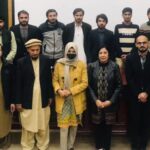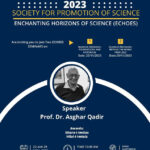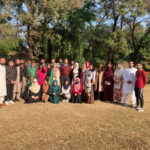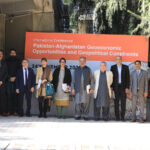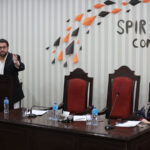Symposium on “Hereditary Blood Disorders”
The experts during a symposium on “Hereditary Blood Disorders” emphasized the molecular diagnosis, carrier screening and measures for better management for blood-borne diseases. The role of society was also highlighted in accepting and catering patients with blood-borne diseases.
The symposium was organized in connection with “World Hemophilia Day” by the Department of Animal Sciences, Quaid-i-Azam University (QAU) and QAU Welfare Society in collaboration with Fatimid Foundation, Peshawar. The main objective of the event was to enhance awareness about inherited blood disorders like Hemophilia, Thallasemia and Leukemia and to motivate the students to donate blood to the suffering patients.
There are more than 50,000 registered transfusion dependent thalassemic patients in Pakistan, and approximately 5,000 babies are born every year with thalassemia in the country. The number of registered hemophilic patients in Pakistan is 20,000. Patients with blood-borne disorders are dependent on blood transfusion throughout their life, which not only adversely compromises their quality of life but also renders a great economic and psychological burden on the affected individuals and their families. Due to the complications arising from blood transfusion and disease management, the mortality of such patients is quite high. The average life expectancy for thalassemic children in Pakistan is only 15 years, compared to 60 years in developed countries.
Dr. Sajid Malik, Associate Prof. Department of Animal Sciences, QAU, welcomed the audience and the resource persons. He presented an overview of the current state of research on Thalassemia and encouraged the students to donate blood with great zeal and enthusiasm.
During the seminar, Dr. Tahir Chodhary, Professor at Islamic International Medical College & Riffah Medical University, Rawalpindi shared his experience on the treatment and management of patients with Hemophilia & Thalassemia. Dr. Rashda Abbasi, Senior Scientific Officer at Institute of Biomedical & Genetic Engineering (IB&GE) Islamabad presented an update on the diagnosis and treatment of Leukemia. Dr. Attiq-Ur-Rehman, former District Health Officer at Peshawar shared his experience as a volunteer medical officer at Fatimid Foundation Peshawar of catering Thallasemic/Hemophilic patients for the last 20 years.
Mr. Mujtaba a student at Quaid-I-Azam School of Management Sciences (QASMS) at Quaid-I-Azam University, Islamabad expressed his sufferings of being a thallasemic patient and dependency on blood transfusion from the last 23 years. In the end of symposium, Dr. Nafees Ahmad, Senior Scientific Officer at Institute of Biomedical & Genetic Engineering (IB&GE) Islamabad appreciated the role of Fatimid Foundation in providing free and safe blood to hundreds of patients with hereditary blood disorders annually. In the blood donation campaign, a large number of students along with faculty members donated blood.
 jobs@QAU
jobs@QAU



